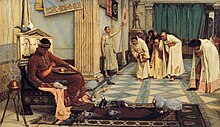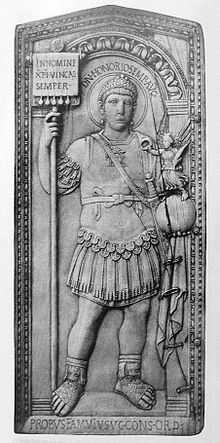Flavius Honorius

Flavius Honorius ( September 9, 384 - August 15, 423 in Ravenna ) was Western Roman Emperor between 395 and 423.
Life
Honorius was the son of Emperor Theodosius I and his first wife Aelia Flacilla . His older brother was the Eastern Roman Emperor Arcadius , his younger half-sister Galla Placidia . Honorius was married twice but remained without an heir. First he married Maria in 398 , the daughter of his cousin Serena and the magister militum (army master) Stilicho . After her death he married her younger sister Thermantia . Thermantia was cast out after her father was overthrown and died in 415.
While his father was still alive, Honorius was elevated to co-emperor ( Augustus ) on January 23, 393 in response to the usurpation of Eugenius in Constantinople . After the victorious battle of Frigidus on 5./6. In September 394, Theodosius summoned him to the court in Milan , and after the surprising death of his father in January 395, the ten-year-old was appointed junior Augustus, emperor of the western half of the empire, while the senior Augustus Arcadius continued to reside on the Bosporus . Formally, the two brothers shared power in the undivided kingdom; they made common laws. At the same time, however, the relationship between the two imperial courts was characterized by a permanent rivalry that repeatedly almost led to civil war.
Honorius' 28-year reign was one of the most eventful in Roman history. When the imperial government refused to pay wages and supplies to the Visigoth foederati under Alaric in 395, they plundered several Eastern Roman provinces for years, including invading Greece. In doing so, they benefited from the rivalries between the two imperial courts: Honorius demanded at this time that the Illyricum and Greece should be added to his part of the empire; therefore the eastern court saw the use of western armies in Greece as an affront and sought rapprochement with the Goths. After several battles between Alaric and the influential army master Stilicho (see below) and Ostrom had come to an understanding with Alaric, these 401 concentrated their campaigns on Italy.
In addition, as the military pressure against the Romans in Gaul and Britain increased at that time , the Western Roman resources were overstretched. Around 400 the Gallic prefecture (one of the two highest administrative authorities of the western empire) was moved from Trier to Arles . While Alaric was plundering northern Italy , the court and Honorius moved from Milan to the Ravenna fortress at the end of 402 . In 402 Stilicho succeeded in repelling Alaric, but already in 405 a large group of barbarians invaded Italy under Radagaisus , but were repulsed by Stilicho with the help of Hunnic foederati under Uldin . When the Rhine border temporarily collapsed at the end of 406 ( Rhine crossing from 406 ), several groups of barbarians streamed into the empire and plundered the provinces of Gaul and Hispania , some of which were lost to the empire as a result of this and the usurpation of local rulers. Britain was completely abandoned. In 407 Constantine III was in Britain . was raised to the rank of anti-emperor, who shortly thereafter translated to Gaul. In 411 he was defeated and executed; but the Romans in Britain no longer recognized Honorius as emperor. The usurpations of Jovinus in Gaul and Maximus in Hispania were also short-lived. Stilicho's plans to attack together with Alarich Ostrom, however, were thwarted by the new military focus in Gaul (see Migration ).
As already mentioned, the army master Flavius Stilicho, who was of semi- Vandal descent, exerted great influence in the first years of Honorius' reign . He managed to expand his position of power in the army and at the imperial court, and later also in the church and senate . In 405 he held the consulate . His extensive Hunnic bodyguard also represented a military power factor. The Stilichos case began with the failure of the campaign plans against Ostrom 407. Alaric demanded compensation for the costs he had had to prepare for this campaign. When Stilicho paid, he lost a lot of reputation in Rome, and Honorius feared him at the same time. Stilicho's position of power was based in particular on the claim to have been appointed guardian of both emperors by Theodosius I; this made it possible for the imperial court in Ravenna to claim priority in the entire empire, although the senior emperor Arcadius resided in the east. This constellation had led to conflicts between the two halves of the empire since 395. But when Arcadius died in the summer of 408, Stilicho was no longer needed at the western court, and intrigues began against him. When he wanted to lead a campaign in Gaul in 408, the troops mutinied and Stilicho was slain on the orders of Honorius. His followers in Rome, often Germanic, were exiled or killed. Unlike in the past, Stilicho is often viewed today as a Roman and a loyal servant of the empire who succumbed to an intrigue, despite his “barbaric” roots - at the same time, however, it cannot be denied that the army master had risen to the actual ruler and thus the position of Honorius had threatened. How actively the emperor himself was involved in the fall of Stilichos is difficult to say.
Honorius would now have had to take over the government himself in order to close the void that Stilicho had left. But in this crucial phase he failed. The emperor's weakness and the raids of the Visigoths and Vandals promoted the rapid disintegration of the western empire. In 408 Honorius rejected an offer of peace by Alaric. The latter then besieged Rome, but withdrew after extensive tribute payments. At the end of 409 a new Visigoth siege of Rome began, while the Senate, at Alaric's insistence , appointed Priscus Attalus as the anti-emperor. This made Alaric the army master, whereupon the Goth demanded the province of Africa for himself, whose commander Heraclianus turned against him, so that an invasion would have been necessary. When further negotiations failed, Alaric's troops sacked Rome in 410. The three-day looting caused a sensation in the entire known world and was interpreted as a clear sign of the decline of the empire, with the pagans citing the apostasy from the old belief in gods as the reason for the catastrophe. The Christian backlash led to the creation of De civitate Dei , written by Augustine of Hippo . The fact that Honorius had not prevented this catastrophe damaged his reputation beyond repair.
Despite the fall of the city of Rome, Honorius continued to refuse to negotiate with Alaric. He then moved to southern Italy, taking Galla Placidia , Honorius' half-sister, with him. The intended crossing to North Africa failed due to bad weather and logistical problems. Alaric eventually died on the way back to northern Italy. Under Alaric's successor Athaulf , the Visigoths moved from northern Italy to southern France and tried to gain a legally secure status within the Western Roman Empire, but this failed. After Athaulf, who had previously married Placidia, died in 415, they were settled as foederati in Gaul in 418 and now fought for a long time on the side of the emperor.
After Stilicho's death, Honorius brought up a general from a Roman family as commander-in-chief: Flavius Constantius , a former follower of Stilichos, who from 411 onwards led campaigns against usurpers such as Constantine (III.) And Jovinus and also defeated the Visigoths and other groups and how said when foederati could settle. The price for these successes was that Constantius now rose to become the real ruler. The increasingly dominant man switched off Heraclianus in 413, married Galla Placidia against her will in 417, became consul three times and finally in February 421 as Constantius III. even co-emperor of Honorius. Since his nephew, the Eastern Emperor Theodosius II , did not want to recognize the elevation of a dynasty alien, Westrom prepared for civil war against Constantinople. But there was no fratricidal war because Constantius III. died that same year. This led to turmoil in Ravenna, in the course of which Galla Placidia fled to Constantinople with her young son Valentinian and her daughter Honoria.
Inside, the reign of Honorius was marked by a whole series of revolts. B. in Gaul, Britain and Africa . The western Roman army disintegrated more and more or was “barbarized” as foederati due to the increased recourse to Germanic tribes . Tax revenues fell as did the economic strength of the Western Roman Empire. The work of Claudian , the most important late Roman poet, at the court of Honorius was of cultural importance .
Honorius, generally considered to be a weak and incompetent emperor, died on August 15, 423 in Ravenna. Since he had never succeeded in taking over the government himself, he was crucially responsible for the power struggles and civil wars that shook Westrom during his reign. His successor was - after an interlude by the usurper Johannes - his nephew Valentinian III. , Son of Galla Placidia and Constantius III. Theodosius II installed Valentinian as Caesar in October 424 and sent him with an army to Italy, where he ascended the throne a year later.
reception

Honorius is best known to posterity because of a famous anecdote handed down by Prokopios of Caesarea , according to which the emperor was more interested in the breeding of his chickens and the well-being of his favorite chicken Roma than in the news of the fall of Rome. This gave rise to the legend of the chicken-breeding emperor, which was immortalized in a well-known picture by John William Waterhouse and which also became a main motif of the comedy Romulus the Great by Friedrich Dürrenmatt (there, however, it is transferred to Romulus Augustulus ).
literature
- Bruno Bleckmann : Honorius and the end of Roman rule in Western Europe . In: Historische Zeitschrift 265, 1997, pp. 561-595.
- Henning Börm : Westrom. From Honorius to Justinian . Stuttgart 2013, pp. 39–65.
- Thomas S. Burns: Barbarians within the gates of Rome. A study of Roman military policy and the barbarians, ca. 375-425 AD . Bloomington 1994.
- Alan Cameron : Claudian. Poetry and Propaganda at the Court of Honorius . Oxford 1970.
- Chris Doyle: Honorius. The Fight for the Roman West AD 395-423. Routledge, London / New York 2019, ISBN 978-1138190887 .
- John Drinkwater: The Usurpers Constantine III (407-411) and Jovinus (411-413) . In: Britannia 29, 1998, pp. 269-298.
- David Engels : The cock of Honorius and the puppy of Aemilia. On the survival of pagan omens in Prokop. In: Antike und Abendland 55, 2009, pp. 118–129.
- Peter J. Heather : The Fall of the Roman Empire: A new history . London et al. 2005.
- John F. Matthews: Western Aristocracies and Imperial Court, AD 364-425 . Oxford 1975.
- Otto Seeck : History of the fall of the ancient world . Vol. 5 and 6. Stuttgart 1920 (presentation rich in facts, but especially out of date in terms of interpretation).
Web links
- Ralph W. Mathisen: Short biography (English) at De Imperatoribus Romanis (with references).
- Marfa Heimbach: 09.09.0384 - Birthday of Emperor Flavius Honorius WDR ZeitZeichen (podcast).
Remarks
- ↑ Mischa Meier , Steffen Patzold : August 410 - A battle for Rome . Klett-Cotta, Stuttgart 2010.
- ^ Prokop, Historien , 3.2.
| predecessor | Office | successor |
|---|---|---|
| Theodosius I. |
Western Roman Emperor 395-423 |
John |
| personal data | |
|---|---|
| SURNAME | Honorius, Flavius |
| ALTERNATIVE NAMES | Emperor Caesar Flavius Honorius Augustus |
| SHORT DESCRIPTION | Western Roman Emperor (395–423) |
| DATE OF BIRTH | September 9, 384 |
| DATE OF DEATH | August 15, 423 |
| Place of death | Ravenna |
